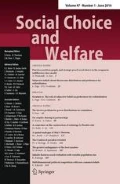Notes
I am grateful to Michael Otsuka for discussion of Adler’s objection to veil of ignorance reasoning.
Yet another leading conception of personal identity requires psychological continuity, defined as an overlapping chain of strong connectedness (see Parfit 1987). Since psychological connectedness between Zelda behind the veil and Arthur and Bob is low, the required identification may be problematic on this view also.
Quoted in Williams (1972, p. 76).
Adler (pp. 518–524) remarks that he finds ex ante Pareto attractive in cases in which there is no outcome inequality because all individuals’ outcomes are perfectly correlated. He therefore expresses sympathy for Fleurbaey (2010) proposal to evaluate an outcome by its “equally-distributed equivalent”—the level of utility that, if equally distributed, would be as valuable as that outcome. Fleurbaey’s SWF respects ex ante Pareto in cases in which there is no outcome inequality, but violates ex ante Pareto in Case 2, in which there is outcome inequality. The difficulty for Adler is that since he does not regard outcome inequality as in itself unfair, he cannot countenance this distinction between these cases. It would therefore be inconsistent of him to adopt Fleurbaey’s proposed SWF.
I am grateful to Luc Bovens and Joe Mazor for comments and to Princeton University’s Center for Human Values for the Faculty Fellowship which supported the writing of this review.
References
Fleurbaey M (2010) Assessing risky social situations. J Political Econ 118:649–680
Lewis D (1983) Survival and identity. In: Philosophical papers, vol I. Oxford University Press, Oxford, pp 55–77
Nagel T (1979) Equality. In: Mortal questions. Cambridge University Press, Cambridge, pp 106–27
NICE (2008) Social value judgments, 2nd edn. NICE, London
Parfit D (1987) Reasons and persons. Clarendon Press, Oxford
Parfit D (2002) Equality or priority. In: Clayton M, Williams A (eds) The ideal of equality. Palgrave, Basingstoke, pp 81–125
Parfit D (2012) Another defence of the priority view. Utilitas 24:399–440
Temkin L (1996) Equality. Oxford University Press, Oxford
Voorhoeve A, Fleurbaey M (2012) Egalitarianism and the separateness of persons. Utilitas 24:381–398
Williams B (1972) Morality. Cambridge University Press, Cambridge
Williams B (1973) The self and the future. In: Williams B (ed) Problems of the self. Cambridge University Press, Cambridge, pp 46–63
Author information
Authors and Affiliations
Corresponding author
Rights and permissions
About this article
Cite this article
Voorhoeve, A. Matthew D. Adler: Well-being and fair distribution: beyond cost-benefit analysis. Soc Choice Welf 42, 245–254 (2014). https://doi.org/10.1007/s00355-013-0721-7
Received:
Accepted:
Published:
Issue Date:
DOI: https://doi.org/10.1007/s00355-013-0721-7

